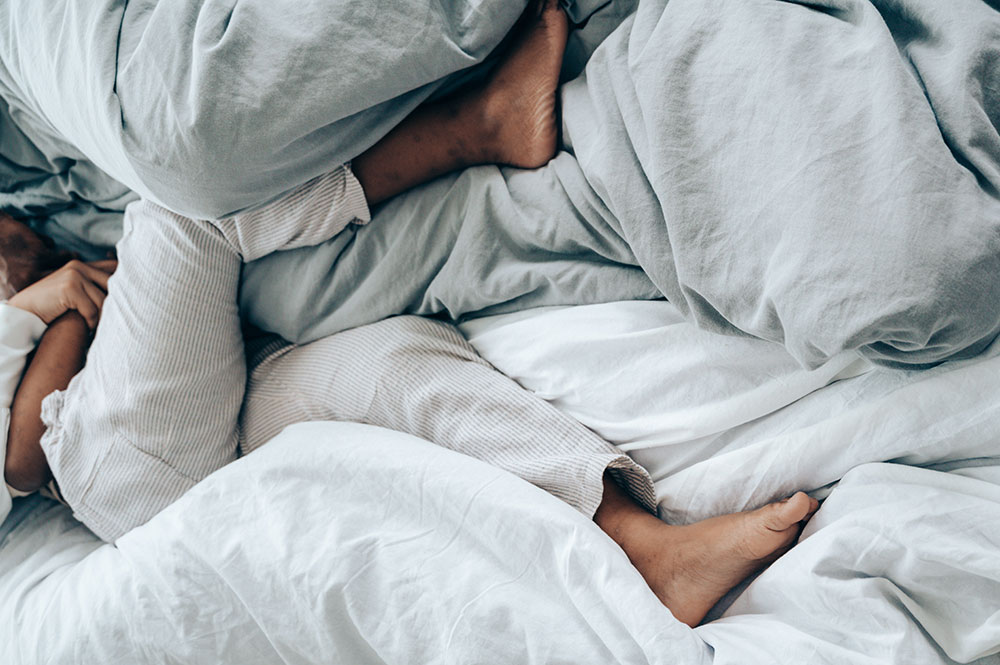
09 Sep How to Shut Down Your Brain When You Can’t Sleep
Some people have got it easy – they lay their heads to rest, close their eyes, and in a few moments, their bodies are twitching like a puppet on the end of a string. Aaaah, the jealousy is real. Conversely, if you are one of those who suffer through the relentless reels of their own personal sitcom series, covering everything from “The most embarrassing thing I’ve ever done” to “The never-ending to-do work list” and everything else in between, then there may be a few golden nuggets of information in here for you.
The content around the issue of sleep anxiety circulates back to the same thing: preparing your mind and body for sleep is about reducing the emotional content in your thoughts (mental) and eliminating external stimuli as much as possible (physical).
Sleep is a process, your body doesn’t automatically shut down just because you’ve climbed into bed. The body is working towards this time of restfulness and rejuvenation all day, by accepting that not all people’s processes are the same and trusting that your body is taking you where it needs to go, you will allow yourself to remove some of the anxiety that gets built up around sleep.
4 Basic Sleep Practices For The Restless Mind:
- Create, and stick to, a routine. As mentioned above – you’re not going to get into bed and just fall asleep. Start your process an hour before you get into bed and work your way towards the moment you lay down; turn off electronic devices, start turning off the lights throughout the house, have a warm shower or bath, take time washing your face and brushing your teeth. Even do a few slow stretches to ease your limbs into relaxation.
- Cool down. Part of the body’s process for falling asleep involves lowering the body’s temperature. The technical explanation around this is that the metabolism of your brain’s frontal cortex wants to be cool when falling asleep. Did you know your body actually loses its ability to regulate its temperature at night, so finding the right balance before you climb into bed is important.
- Invest in red light and avoid blue light. The short-wavelength of blue light literally stops the production of melatonin (the hormone necessary for sleep) whereas red light will allow your melatonin levels to operate at an optimal level for sleep. In a world of laptops and cellphones, cutting off your exposure to blue is probably the most effective and impactful way you can improve your sleeping patterns.
- Practice breathing through your left nostril. It’s a simple exercise: cover your right nostril and breathe deeply in and out of your left nostril 10 times. This practice is said to help relax your sympathetic nervous system. The mental meditation around simply focusing on the task of breathing can help keep your mind from wandering too.
Other Ways To Improve Sleep:
- Stop consuming caffeine after 3pm
- Drinking more than 2 units of alcohol before bed might help you in falling asleep but it will decrease the quality of your sleep later in the night when your body starts to metabolise the alcohol.
- Make your bed a place for sleep and intimacy only. Avoid working and watching movies on your laptop from bed.
- Exercise! Physically exhausting yourself is one of the best ways to ensure that you go down for the night, and your body will spend the time recourerating.
References:
https://www.cnbc.com/2017/10/06/this-is-the-best-time-to-have-your-cup-of-coffee.htm
http://healthysleep.med.harvard.edu/healthy/science/how/external-factors
https://psychcentral.com/lib/12-ways-to-shut-off-your-brain-before-bedtime/
https://byrslf.co/how-to-put-your-mind-to-sleep-79f3495c80b7



No Comments